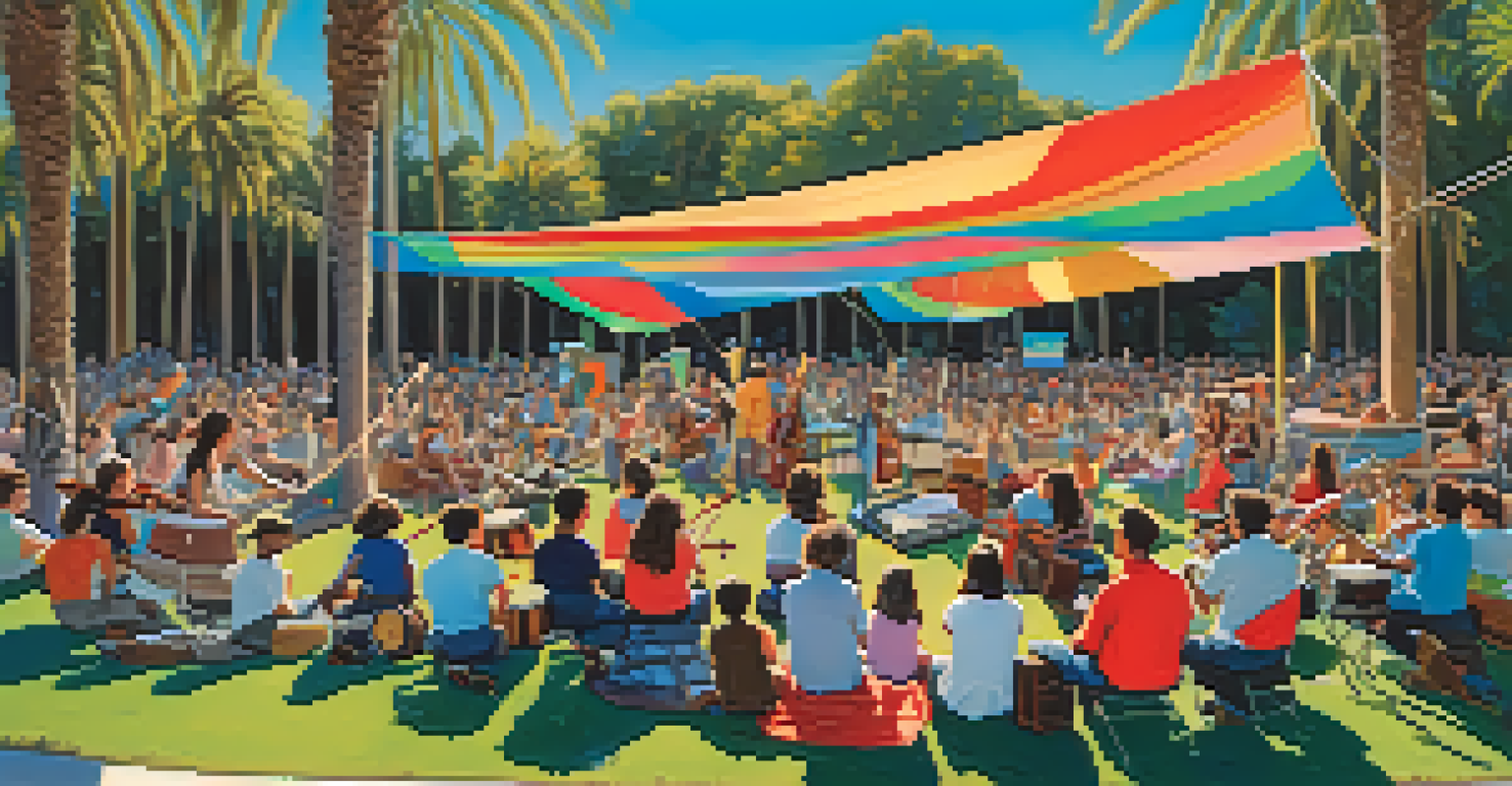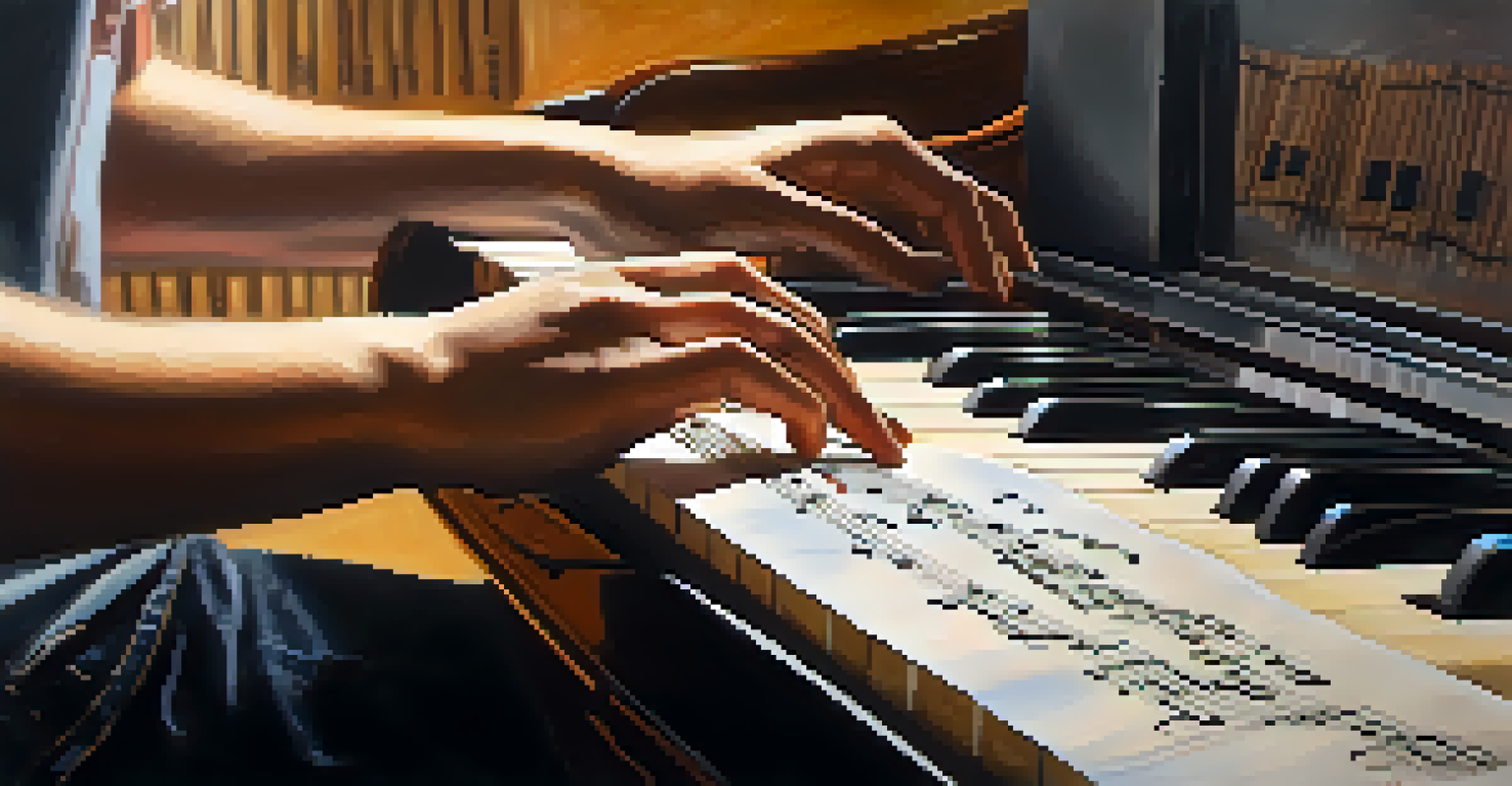The Impact of Music Education in Los Angeles on Artists

The Role of Music Education in Los Angeles
Los Angeles is a vibrant hub for the arts, where music education plays a crucial role in nurturing talent. From public schools to private institutions, music programs offer students the tools they need to express themselves creatively. These educational opportunities help foster a strong sense of community and collaboration among young musicians.
Music can change the world because it can change people.
In this city, music education isn't just about learning notes and rhythms; it's about developing an artistic identity. Many students discover their passion for music through exposure to various genres, instruments, and influential artists in the area. This exploration helps them find their unique voice and style, which is essential for their future careers.
Moreover, the accessibility of music education in Los Angeles means that diverse cultural backgrounds are represented. This rich tapestry of influences leads to a more dynamic music scene, where artists can draw inspiration from each other. The collaborative spirit cultivated in these programs often results in innovative sounds that redefine music trends.
How Music Education Shapes Artistic Skills
Music education provides artists with essential skills that extend beyond musicality. Students learn discipline, perseverance, and teamwork, qualities that are vital for success in any creative field. These skills not only enhance their musical abilities but also prepare them for real-world challenges in the music industry.

For example, participating in ensembles teaches students how to work harmoniously with others, an experience that mirrors the collaborative nature of professional music creation. They learn to listen, adapt, and contribute meaningfully to a collective effort, which is invaluable when they eventually collaborate with other artists and producers.
Music Education Fosters Creativity
In Los Angeles, music education nurtures artistic identity and innovation, allowing students to explore diverse genres and develop their unique sound.
Additionally, music education encourages critical thinking and problem-solving. Students often face creative challenges, whether it's composing a piece or arranging music for a group. Navigating these obstacles fosters a sense of creativity that helps them tackle future projects with confidence.
The Impact of Community Programs on Local Artists
In Los Angeles, community music programs serve as a lifeline for aspiring artists. These initiatives provide access to instruments, lessons, and performance opportunities that might not be available otherwise. They play a vital role in leveling the playing field, ensuring that all passionate individuals can pursue their musical dreams, regardless of their financial situation.
Education is the most powerful weapon which you can use to change the world.
These programs often emphasize inclusivity and diversity, allowing artists from various backgrounds to come together. This melting pot of talent fosters collaboration and innovation, resulting in unique musical expressions that reflect the city's rich cultural landscape. Many successful artists credit community programs as a foundational aspect of their journey.
Furthermore, community programs often create connections between young musicians and seasoned professionals. Mentorship opportunities abound, providing guidance and industry insights that help budding artists navigate their careers more effectively, ultimately strengthening Los Angeles' music ecosystem.
Notable Artists Influenced by LA's Music Education
Many renowned artists have roots in Los Angeles's music education scene, highlighting its impact on their careers. For instance, musicians like Billie Eilish and her brother Finneas O'Connell cultivated their skills through local programs and schools. Their success story showcases how education can launch talented individuals into the limelight.
Additionally, artists like Kendrick Lamar benefited from the rich musical culture in LA, which was shaped by music education initiatives. The diverse influences he encountered during his formative years helped him develop a unique sound that resonates with audiences worldwide.
Community Programs Enhance Access
Community music programs in LA provide vital resources and opportunities for aspiring artists from various backgrounds, promoting inclusivity and collaboration.
These examples illustrate a powerful truth: the seeds of creativity planted in music classrooms can lead to groundbreaking work in the industry. As these artists continue to thrive, they serve as inspirations for the next generation, proving that music education can indeed be a game-changer.
The Connection Between Education and Artistic Innovation
The intersection of music education and artistic innovation in Los Angeles is undeniable. As students immerse themselves in learning, they often experiment with new ideas and styles, leading to fresh sounds and concepts. This innovative spirit is a hallmark of Los Angeles's music scene, pushing boundaries and reimagining genres.
For instance, students exposed to various musical traditions may blend elements of hip-hop, jazz, and electronic music, creating something entirely new. This experimentation is crucial for artistic growth, as it encourages musicians to think outside the box and redefine their creative processes.
Moreover, music education fosters an environment where taking risks is encouraged. This willingness to explore uncharted territory is essential for innovation, allowing artists to break free from conventional molds and create work that resonates deeply with audiences.
Challenges Facing Music Education in Los Angeles
Despite its many benefits, music education in Los Angeles faces significant challenges. Budget cuts and diminishing resources often threaten the continuation of music programs in schools, limiting access for aspiring musicians. This is particularly concerning in underserved communities, where such opportunities can make a profound difference.
Additionally, the increasing focus on standardized testing in schools can overshadow the importance of arts education. Many educators feel pressured to prioritize core subjects, which may lead to music programs being reduced or eliminated altogether. This trend threatens the rich musical landscape that Los Angeles is known for.
Challenges Threaten Music Education
Despite its benefits, music education in Los Angeles faces significant challenges due to budget cuts and a focus on standardized testing, particularly affecting underserved communities.
Nevertheless, advocates for music education continue to fight for its place in schools. They recognize that fostering creativity and artistic expression is crucial for developing well-rounded individuals, and they strive to ensure that the next generation of artists has the support they need to thrive.
The Future of Music Education and its Influence
Looking ahead, the future of music education in Los Angeles holds both challenges and opportunities. As technology continues to evolve, new tools and platforms emerge that can enhance the learning experience. Online resources and virtual lessons can help bridge gaps for students who may not have access to traditional programs.
Moreover, there is a growing recognition of the importance of arts education among policymakers and communities. Increased advocacy efforts are shining a light on the value of music education, which could lead to more funding and resources for programs in the future. This shift could create a more robust foundation for aspiring artists.

Ultimately, the impact of music education on artists in Los Angeles is a story of resilience and creativity. With continued support, there's no telling how the next generation of musicians will shape the sound of the city and beyond, carrying forward the legacy of artistic innovation.